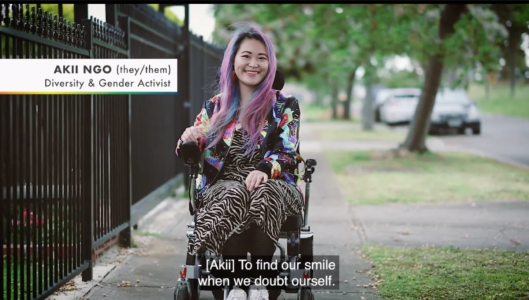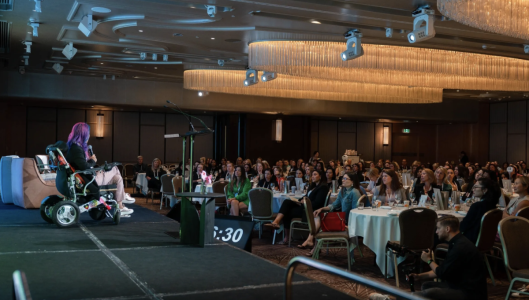Jetstar issues apology after incident with wheelchair user
By
Seia Ibanez
- Replies 18
Navigating the skies can be a daunting experience for many, but for those with disabilities, the challenges can be even more formidable.
In a recent incident that has sparked widespread concern, Jetstar has been forced to issue an apology after a wheelchair user, Akii Ngo, suffered a fall at Adelaide Airport due to a staff member mishandling an airline wheelchair.
Ngo's ordeal began as they disembarked from a Jetstar aircraft at Adelaide Airport in May 2022. Accustomed to the independence afforded by their customised electric wheelchair, Ngo was reliant on the airline's wheelchair and staff assistance to navigate through the airport.
Tragically, this reliance led to an accident that has had a lasting impact on Ngo's life.
'The experience was quite distressing, upsetting, very overwhelming,' they recounted, emphasising the ongoing effects of the incident.

In response to the incident and the subsequent complaint filed with the Australian Human Rights Commission, Jetstar has publicly apologised and acknowledged the need for change.
‘On this occasion, unfortunately, the staff member operated the aisle wheelchair in a way that contributed to the accident that occurred,’ it said.
‘Jetstar sincerely apologises for the unfortunate accident that occurred at Adelaide Airport and for the impact this experience has had on Akii.’
'Akii's experience has contributed to an enhanced awareness of the needs of customers requiring wheelchair assistance and will assist with staff training and delivery of wheelchair assistance to customers in the future,' the airline added.
Disability advocates, including Justice and Equity Centre Senior Solicitor Sheetal Balakrishnan, have called for enforceable standards that ensure equal access to air travel for people with disabilities.
‘We, together with the disability community, have been advocating strongly that there needs to be a standard for air travel that allows for people with disabilities to be included, for air travel services to be accessible, and for them to have equal access to air travel,’ Balakrishnan said.
‘Those standards also need to be enforceable so that if an airline or an airport doesn't comply to the standards then action can be taken by a regulator to make sure that they comply.’
Balakrishnan also said the current system ‘put the burden on people to have to bring to the attention of authorities that there's discrimination happening’.

Ngo's experience is not an isolated case. They have faced other troubling experiences with different airlines, including the damage to their customised wheelchair.
‘That meant that I was literally housebound for as long as it took for the chair to get fixed,’ they said.
‘Because it was viewed as luggage, there was no priority that goes, “We need to get this sorted ASAP”. It was, “Oh well, it was just an inconvenience, you broke some luggage” when really it's like your legs and your ability to move about the world.’
The fear of damaged or lost mobility aids is a constant concern for wheelchair users when travelling, and Ngo's experience underscored the 'luck of the draw' nature of current air travel for those with disabilities.
‘There is already additional work for people with disabilities to travel, the additional hoops we have to jump through or go through to even get onto a plane or even just to get approved to be able to fly,’ Ngo added.
Ngo's call for systemic change is a rallying cry for the industry to adopt whole-of-organisation policies and consistent industry standards.
‘Having a consistent process across the board regardless of the airline but also airports just to make the process more accessible and equitable because not everybody with a disability who are wheelchair users have the same needs and requirements, but they should at least know what to expect when it comes to air travel,’ they said.
‘It shouldn't be this difficult, and the way people with disabilities are treated needs to be better supported.’
However, other airlines have received backlash due to its loopholes for disabled passengers.
In a similar story, a passenger was denied boarding a Virgin Australia flight because her wheelchair was too heavy for the aircraft’s weight limit.
Virgin Australia has since apologised for the incident, refunded the cost of the flight, and promised further training for staff and reviews of service and processes. You can read more about the story here.
 Have you or someone you know encountered difficulties while flying? What changes would you like to see implemented to make air travel more inclusive? Share your thoughts and stories in the comments below!
Have you or someone you know encountered difficulties while flying? What changes would you like to see implemented to make air travel more inclusive? Share your thoughts and stories in the comments below!
In a recent incident that has sparked widespread concern, Jetstar has been forced to issue an apology after a wheelchair user, Akii Ngo, suffered a fall at Adelaide Airport due to a staff member mishandling an airline wheelchair.
Ngo's ordeal began as they disembarked from a Jetstar aircraft at Adelaide Airport in May 2022. Accustomed to the independence afforded by their customised electric wheelchair, Ngo was reliant on the airline's wheelchair and staff assistance to navigate through the airport.
Tragically, this reliance led to an accident that has had a lasting impact on Ngo's life.
'The experience was quite distressing, upsetting, very overwhelming,' they recounted, emphasising the ongoing effects of the incident.

Akii Ngo suffered a fall at Adelaide Airport due to Jetstar’s staff member mishandling. Credit: Akii Ngo website
In response to the incident and the subsequent complaint filed with the Australian Human Rights Commission, Jetstar has publicly apologised and acknowledged the need for change.
‘On this occasion, unfortunately, the staff member operated the aisle wheelchair in a way that contributed to the accident that occurred,’ it said.
‘Jetstar sincerely apologises for the unfortunate accident that occurred at Adelaide Airport and for the impact this experience has had on Akii.’
'Akii's experience has contributed to an enhanced awareness of the needs of customers requiring wheelchair assistance and will assist with staff training and delivery of wheelchair assistance to customers in the future,' the airline added.
Disability advocates, including Justice and Equity Centre Senior Solicitor Sheetal Balakrishnan, have called for enforceable standards that ensure equal access to air travel for people with disabilities.
‘We, together with the disability community, have been advocating strongly that there needs to be a standard for air travel that allows for people with disabilities to be included, for air travel services to be accessible, and for them to have equal access to air travel,’ Balakrishnan said.
‘Those standards also need to be enforceable so that if an airline or an airport doesn't comply to the standards then action can be taken by a regulator to make sure that they comply.’
Balakrishnan also said the current system ‘put the burden on people to have to bring to the attention of authorities that there's discrimination happening’.

Disability advocates, including Ngo, have called for equal access for people with disabilities. Credit: Akii Ngo website
Ngo's experience is not an isolated case. They have faced other troubling experiences with different airlines, including the damage to their customised wheelchair.
‘That meant that I was literally housebound for as long as it took for the chair to get fixed,’ they said.
‘Because it was viewed as luggage, there was no priority that goes, “We need to get this sorted ASAP”. It was, “Oh well, it was just an inconvenience, you broke some luggage” when really it's like your legs and your ability to move about the world.’
The fear of damaged or lost mobility aids is a constant concern for wheelchair users when travelling, and Ngo's experience underscored the 'luck of the draw' nature of current air travel for those with disabilities.
‘There is already additional work for people with disabilities to travel, the additional hoops we have to jump through or go through to even get onto a plane or even just to get approved to be able to fly,’ Ngo added.
Ngo's call for systemic change is a rallying cry for the industry to adopt whole-of-organisation policies and consistent industry standards.
‘Having a consistent process across the board regardless of the airline but also airports just to make the process more accessible and equitable because not everybody with a disability who are wheelchair users have the same needs and requirements, but they should at least know what to expect when it comes to air travel,’ they said.
‘It shouldn't be this difficult, and the way people with disabilities are treated needs to be better supported.’
However, other airlines have received backlash due to its loopholes for disabled passengers.
In a similar story, a passenger was denied boarding a Virgin Australia flight because her wheelchair was too heavy for the aircraft’s weight limit.
Virgin Australia has since apologised for the incident, refunded the cost of the flight, and promised further training for staff and reviews of service and processes. You can read more about the story here.
Key Takeaways
- Jetstar has apologised to Akii Ngo, a wheelchair user who fell out of an airline-provided wheelchair at Adelaide Airport after being pushed by a staff member.
- The incident, which occurred in May 2022 and resulted in a complaint to the Australian Human Rights Commission, had a lasting impact on Ngo and highlighted the need for improved accessibility and standards within the aviation industry.
- The airline acknowledged its mistake and has agreed to enhance its approach to assisting customers who require wheelchairs, focusing on improving staff training.
- Disability advocates, including Ngo, are calling for systemic change in the aviation industry to ensure consistent, accessible, and equitable treatment of passengers with disabilities, emphasising that mobility aids should be treated with the same urgency and care as the passengers themselves.







